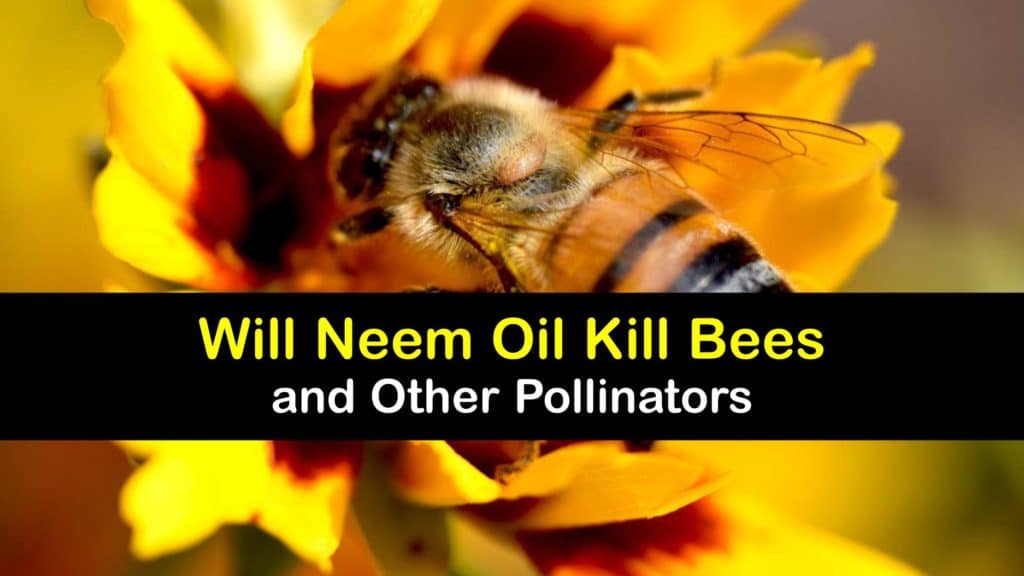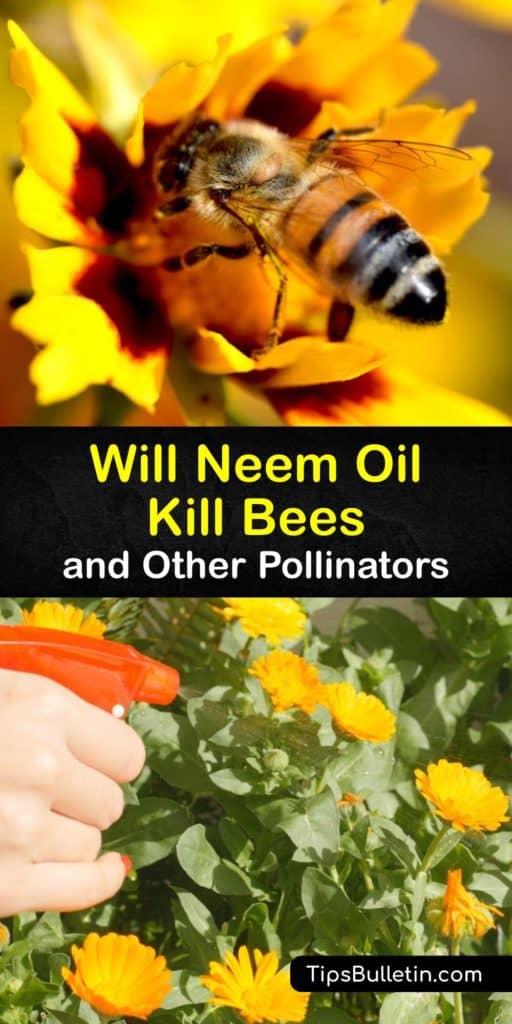Given its incredible pest control benefits, many gardeners ask, is neem oil safe for bees? Though there is a common and unfortunate misconception that neem oil will kill bees, it’s harmless to honey bees, bumblebees, butterflies, and other beneficial garden guests.
The extract from the neem tree, Azadirachta indica, and the neem seed are known as neem oil. Gardeners frequently use neem oil to fight garden pests because it includes multiple active chemicals in its raw form, including azadirachtin – the main active ingredient.
Neem oil is a natural substance with various uses, from health and personal care to gardening and food production. In addition to controlling insect pests, neem oil addresses troublesome issues such as fungal infections like powdery mildew. Using the oil is straightforward and non-toxic to humans and pet animals like dogs and cats while being tough on destructive pests.

Everything You Need to Know – Will Neem Oil Kill Bees?
Learn about will neem oil kill bees and the best ways to use neem oil to beat problems in your garden. If you’ve heard that neem oil will kill bees, a little knowledge demonstrates why that’s not the case.
Bees and other beneficial insects play a crucial role in pollination to increase the number of beautiful flowers or tasty fruits and vegetables we enjoy from the garden. Many gardeners want to know what attracts carpenter bees, as they hope to preserve these benefits when tackling pests.

If you’re asking, is neem oil safe for bees, you’re not alone. Fortunately, the answer is yes; neem oil is safe for bees, other beneficial insects, pets, and people.
Is Neem Oil Safe for Bees and Other Beneficial Insects?
Neem oil is non-toxic for humans and animals and safe for honey bees, butterflies, and other beneficial insects and pollinators visiting the garden. As a systemic insecticide, neem oil is absorbed into the plant internally.
Beneficial insects visit the plant but do not feed on it. Neem oil acts on insect pests which do feed on and damage the plant when they take a bite. Avoiding flowers and spraying early in the morning or late in the evening before pollinators visit reduces the chances of them accidentally contacting the mixture, whether they are bees that live in the ground or elsewhere in the area.
Neem Oil Will Kill Bees is a Common Misconception
The idea of neem oil threatening bees is a common misunderstanding. As it’s a systemic insecticide, neem oil poses no threat to bees and other pollinators, which play a critical role in the vegetable garden and orchard. In addition to being safe for honey bees, birds, and butterflies, neem oil is also harmless to people and pets. Neem oil is safe for cats and dogs and other animals, too.
Neem Oil in Garden Pest Control
Cold pressed neem oil is often used in pest control to reduce bugs and fungus on fruit trees, ornamental plants, or an edible plant without harming pollinators.
Whether you have indoor plants or your outdoor plant is struggling with fungal disease or a pest like a spider mite, neem oil is a systemic insecticide that works quickly to protect your plant leaves without harming bumble bees. It’s easy to kill aphids with neem oil, as well as other plant pests, leaving the flowers for bees and butterflies to enjoy.
DIY Neem Oil Spray Pesticide
If an insect pest is damaging your plant leaf, neem oil removes them without threatening the honey bee. Castile soap contains fatty acids to attack the soft bodies of leaf-consuming insects and swiftly dissolves them. This broad-spectrum pesticide is effective against a variety of common plant pests.
Blend the items in a spray bottle and use liberally on your affected plant. Cover all leaf surfaces to ensure pest control without worrying about honey bees. Neem oil is often mixed with other pesticides such as horticultural oils and insecticidal soap to make a more potent foliar spray. Try neem oil for slugs and use neem oil for squash beetles that eat your plants, too.
Homemade Neem Oil Soil Drench
Because it contains such high concentrations of powerful active components, pure neem oil is most effective when used to soak the soil, but if applied undiluted to the leaves or any other part of the plant, it could cause burns.
Soil soaks, often referred to as neem oil soil drenches, are currently the most successful application of neem oil. The drench is absorbed into the ground, where the plant roots take it up.
Neem oil works as a systemic insecticide because the plant absorbs and stores it. When using this method, instead of applying it topically, there is no chance for beneficial insects to come into contact with it. The only living things targeted are the insects feeding on plant leaves.
Pour two to three cups of the soil drench around the roots of each plant. Repeat the technique once every two weeks if you want to get rid of an established infestation.
Using soil soaks rather than sprays when treating trees and large bushes is more convenient because it saves time and effort. Drenches are non-toxic and remain in the plant for up to 22 days. They are safe to use on crops close to harvest time.
Tips for Using Neem Oil
Though neem oil is easy to apply, taking a few measures when spraying your garden or indoor plants helps avoid mistakes. Plant leaves may burn if exposed to direct, bright sunlight after spraying or if you add too much neem oil to your mixture.
Growers should not spray neem on early seedlings since it burns them. Mix a small amount of neem spray the day you intend to use it. If left too long, neem oil combinations grow thick and clumpy, making them challenging to spray or pour.
The scent of peppermint repels many insects, so adding a few drops of peppermint essential oil to your neem mixture or drench makes the solution more bug-repellent. Neem oil is a non-toxic and effective insect control option for treating bugs in your garden. The oil works well on other plant ailments such as fungal disease, too.
If your pest issues aren’t resolved with neem oil treatments, consider contacting the National Pesticide Information Center or Environmental Protection Agency for advice and support on using neem oil correctly.

If you loved this article on is neem oil safe for bees, please share this brilliant information on will neem oil kill bees with your friends and family on Pinterest and Facebook.